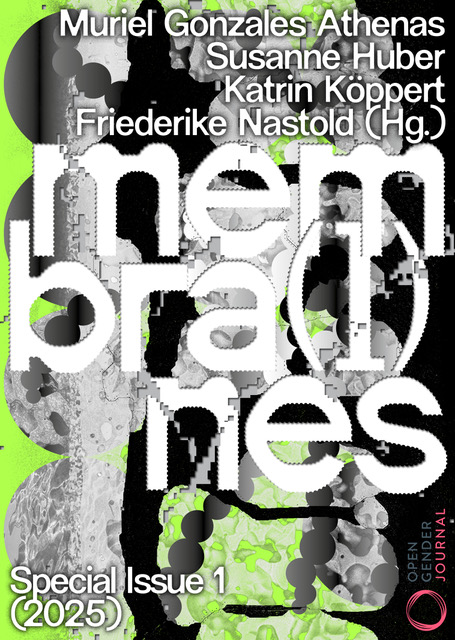Membra(I)nes as Resonance Bodies of Refusal. A Speculative Resounding of Vulnerable Stress Performances in the University
DOI:
https://doi.org/10.17169/ogj.2025.309Keywords:
Body, Care, Gut, Stress, UniversityAbstract
Stress is an intimate and familiar concept, yet it is often hard to address and deal with in practice. This article focuses on the autobiographical writings of recurring stress in the university that were produced by a group of gender studies students using the method of memory work. It explores stress as a potentially injurious and wounding force as well as possible ways of collectively responding to and “caring with” stress. Drawing on historical and early psychoanalytical work on nervous exhaustion and the role of mucous membranes, the author examines stress in relation to the concept of membra(I)nes, arguing that this concept presents a new starting point for listening to the students’ writings about stress. Here, stress is audible as a form of nervous muscular agitation that affects different parts of the body and the gut. Read with feminist theory, the act of refusal becomes one potent concept in the students’ regeneration of power. The author also explores the stomach growl, or borborygami, and the underlying intersection between the brain and the digestive system, in borborygami’s potential for care and collective response.
References
Andrews, Mark (2002): Why Does your Stomach Growl when you are Hungry? Scientific American. https://www.scientificamerican.com/article/why-does-your-stomach-gro/ (31 July 2024).
Anzaldúa, Gloria E. (2002 [1981]): Speaking in Tongues. A Letter to Third World Women Writers. In: Moraga, Cherrie/Anzaldúa, Gloria E. (Ed.): This Bridge Called My Back. Writings by Radical Women of Color. Berkely: Third Woman Press, 183–193.
Beard, George M. (1881): American Nervousness, Its Causes and Consequences. A Supplement to Nervous Exhaustion (Neurasthenia). New York: Putnam. doi: 10.1037/10585-000
Berlant, Lauren (2011): Cruel Optimism. Durham: Duke University Press. doi: 10.1515/9780822394716
Berlant, Lauren/Lee Edelman (2014): Sex, Or the Unbearable. Durham: Duke University Press. doi: 10.1215/9780822377061
Bleuler, Eugen (1910): Zur Theorie des schizophrenen Negativismus. In: Psychiatrisch-Neurologische Wochenschrift 18, 171-176.
Campt, Tina M. (2019): Black Visuality and the Practice of Refusal, Women & Performance 29 (1), 79–87. doi: 10.1080/0740770X.2019.1573625
Campt, Tina M. (2017): Listening to Images. Durham: Duke University Press. doi: 10.1515/9780822373582
Chen, Mel Y. (2023): Intoxicated: Race, Disability, and Chemical Intimacy Across Empire. Durham: Duke University Press. doi: 10.1353/book.118008
Da Silva, Guy (1990): Borborygmi as Makers of Psychic Work During the Analytic Session. In: International Journal of Psycho-Analysis 71, 641–659.
Diprose, Rosalyn (2002): Writing in Blood. Response to Helen Keane and Marsha Rosengarten, ‘On the Biology of Sexed Subjects’. In: Australian Feminist Studies 17 (39), 279–282. doi: 10.1080/0957126022000018089
Ferenczi, Sándor (2002 [1926]): Further Contributions to the Theory and Technique of Psycho Analysis by Sándor Ferenczi. Translated by Jane Isavelk Suttie. London: Karnac.
Ferenczi, Sándor (1988 [1932]): The Clinical Diary of Sándor Ferenczi. Edited by Judith Dupont, translated by Michael Balint and Nicvola Zarday Jackson. Cambridge: Harvard University Press.
Ferenczi, Sándor (1968 [1923]): Thalassa. A Theory of Genitality. Translated by Henry A. Bunker. New York: W.W. Norton.
Freud, Sigmund (1961 [1920]): Beyond the Pleasure Principle. Translated and newly edited by James Strachey. New York: W.W. Norton.
Freud, Sigmund (1953 [1905]): Three Essays on the Theory of Sexuality. In: Strachey, James (Ed): The Standard Edition of the Complete Psychological Works of Sigmund Freud. Volume VII. pp. London: Howarth, 123–246.
Geronimus, Arline T. (2023): Weathering: The Extraordinary Stress of Ordinary Life on the Body in an Unjust Society. London: Virago Press.
Gill, Rosalind (2010): Breaking the Silence. The Hidden Injuries of the Neoliberal University. In: Ryan-Flood, Roisin/Gill, Rosalind (Ed.): Secrecy and Silence in the Research Process. London: Routledge, 228–244. doi: 10.1515/fs-2016-0105
Gill, Rosalind/Donaghue, Ngaire (2016): Resilience, Apps and Reluctant Individualism. Technologies of Self in the Neoliberal Academy. In: Women Studies International 54, 91–99. doi: 10.1016/j.wsif.2015.06.016
Haug, Frigga (1988): Sexualisierung der Körper. Hamburg: Argument.
Hersey, Tricia (2024): Rest is Resistance. A Manifesto. New York: Little, Brown Spark.
Hinkle, Laurence M. (1974): The Concept of ‘Stress’ in the Biological and Social Sciences. In: International Journal of Psychiatry in Medicine 594, 335–357. doi: 10.2190/91DK-NKAD-1XP0-Y4RG
Jaffe, Sarah (2022): Work Won’t Love You Back. How Devotion to Our Jobs Keeps Us Exploited, Exhausted and Alone. London: Hurst.
King, Angela (2011): When the Body Speaks. Tummy Rumblings in the Therapeutic Encounter. In: British Journal of Psychotherapy 27 (2), 156–174. doi: 10.1111/j.1752-0118.2011.01233.x
Kirby, Vicki (1997): Telling Flesh. The Substance of the Corporeal. New York: Routledge.
Landecker, Hannah (2024): Erratum to. How the Social Gets under the Skin. From the Social as Signal to the Society as a Metabolic Milieu. In: Kölner Zeitschrift für Soziologie und Sozialpsychologie. doi: 10.1007/s11577-024-00966-y
Mackenzie, Adrian/Roberts, Celia (2017): Adopting Neuroscience. Parenting and Affective Indeterminacy. In: Body & Society 23 (3), 130–155. doi: 10.1177/1357034X17716521
Roberts, Celia (2018): Caring for Cortisol. Paper presented at the 4S/EASST conference. University of Lancaster, 18 July 2018.
Rogowska-Stangret, Monika/Cielemecka, Olga (2020): Vulnerable Academic Performances. Dialogue on Matters of Voice and Silence in Academia. In: Matter. Journal of New Materialist Research 1 (2), 23–51. doi: 10.1344/jnmr.v1i1.30161
Schrader, Astrid (2024): Reading Science – Caring with Microbes. In: Colman,
Felicity/van der Tuin, Iris (Ed.): Methods and Genealogies of New Materialisms. Edinburgh: Edinburgh University Press, 152–174. doi: 10.1515/9781399530071-011
Singh, Julietta (2018): Unthinking Mastery. Dehumanism and Decolonial Entanglements. Durham: Duke University. doi: 10.1515/9781478091042
Sompayrac, Lauren (2022): How the Immune System Works. Hoboken: Wiley Blackwell.
Stengers, Isabelle (2020): Another Science is Possible: A Manifesto for Slow Science. Translated by Stephen Muecke. Cambridge: Polity Press.
Tuck, Eve/Yang, K. Wayne (2013): R-Words. Refusing Research. In: Paris, Paris/Winn, Maisha T. (Ed.): Humanizing Research. Decolonizing Inquiry with Youth and Community. Los Angles: Sage, 289–308. doi: 10.4135/9781544329611.n12
Warwick, Andrew (2003): Masters of Theory. Cambridge and the Rise of Mathematical Physics. Chicago: University of Chicago Press. doi: 10.7208/chicago/9780226873763.001.0001
Wilson, Elizabeth A. (2015): Gut Feminism. Durham: Duke University. doi: 10.2307/j.ctv11hpr18
Wilson, Elizabeth A. (2004): Psychosomatic. Feminism and the Neurological Body. Durham: Duke University Press. doi: 10.1515/9780822386384

Downloads
Published
How to Cite
Issue
Section
License
Copyright (c) 2025 Dagmar Lorenz-Meyer

This work is licensed under a Creative Commons Attribution 4.0 International License.
All contributions in Open Gender Journal are published under the Creative Commons Attribution 4.0 International license. You may freely make use of the corresponding texts in accordance to the conditions of the license (License contract, generally understandable version). There is no exclusive transfer of usage rights ("copyright transfer"). Open Gender Journal does not charge authors any costs for publication (so-called Article Processing Charges, APC) or submission (so-called Submission Charges). Authors are encouraged to share their contributions in other places, such as repositories.












